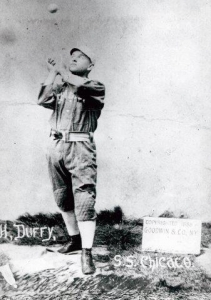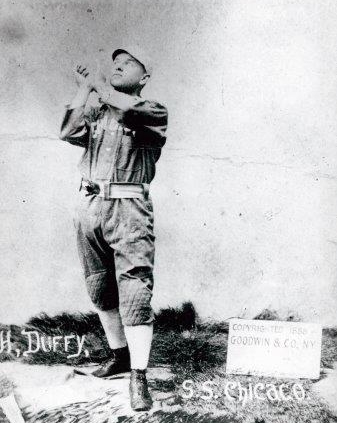September 3, 1896: Boston Beaneaters put their batting clothes on
 It was the third doubleheader in as many days for the weary Boston Beaneaters. Shortstop Herman Long, nursing a badly bruised arm after being hit by a pitch in the opening game of the previous day’s twin bill, was relegated to the bench, and first baseman Tommy Tucker, who’d played every game so far this season, was out nursing a sprained wrist.
It was the third doubleheader in as many days for the weary Boston Beaneaters. Shortstop Herman Long, nursing a badly bruised arm after being hit by a pitch in the opening game of the previous day’s twin bill, was relegated to the bench, and first baseman Tommy Tucker, who’d played every game so far this season, was out nursing a sprained wrist.
Juggling his lineup, manager Frank Selee shifted team captain and regular left fielder Hugh Duffy to shortstop in place of Long, and installed backup catcher Charlie Ganzel at first. Dan McGann was slotted at second base in place of Bobby Lowe, who’d been in and out of the lineup while recovering from a broken collarbone. “Happy Jack” Stivetts, whose ability with the bat earned him an occasional game in the outfield when he wasn’t scheduled to pitch (Stivetts would hit .347 with three home runs in 1896), took Duffy’s spot in left field.
“It was lucky for the Bostons that they had their batting clothes on,” remarked one journalist in attendance, “for they presented a nine in the field which on paper was one of the weakest that has represented them for years.”1 With two pitchers and two catchers in the game and Duffy roaming the infield, it must have seemed a patchwork squad to even the most fervent of the 2,500 faithful at South End Grounds that afternoon.
Selected by Selee to start for Boston was right-hander Jim Sullivan, who had pitched three-plus innings of relief in a loss to Louisville two days before. Browns manager-baseman Tommy Dowd tapped journeyman right-hander Bill Hart, on his way to an NL-leading 29 losses, to start.
The Beaneaters, exercising the home team’s prerogative, chose to bat first. Billy Hamilton and Fred Tenney opened the game with singles, and Duffy walked to load the bases. Ganzel’s fly out to left brought in Hamilton, and after Stivetts grounded out to first, McGann’s long single drove in Tenney and Duffy, staking Boston to a 3-0 lead. The Browns struck back in their half of the inning when Dowd doubled, then stole third and scored on veteran first baseman Roger Connor’s single.
Third baseman Jimmy Collins led off the Boston second inning with a single. Sullivan doubled, scoring Collins, and Hamilton and Tenney singled, bringing in Sullivan. Duffy lined the ball over the left-field fence for a three-run homer, and the Beaneaters found themselves up 8-1. Sullivan made quick work of the Browns in the bottom of the inning, striking out two.
Boston scored a run in the third inning, driving Hart from the game, and another in the fourth off reliever Bill Kissinger. Marty Bergen’s double, Collins’s triple, and a single by Sullivan gave Boston two more runs in the fifth. Dowd gave the Browns a fleeting lift by depositing a pitch over the left-field fence in the bottom of the fifth to notch a second run for St. Louis.
In the seventh, Bergen led off for Boston with a sharp single. Collins poked a single to right. After Sullivan went down swinging, Hamilton and Tenney each singled, bringing Duffy up to the plate once again with the bases full. Swinging on the first pitch, Duffy drove the ball over the fence for a grand slam. “As it went sailing out over the tracks, it looked as safe as Old Glory flying over Fort Warren,” waxed sportswriter Tim Murnane of the Boston Globe. “It was the finest hit made on the Boston grounds this season.”2 After Ganzel was put out, Stivetts banged a triple, Bergen singled for his second hit of the inning, and Collins doubled for his. Sullivan was retired once again for the third out.
With the score now 20-2 for Boston, some in attendance thought the Browns had suffered enough. “There were those among the spectators so surfeited with home runs, three-baggers, doubles and a legion of singles that they wanted the game called,” observed one writer.3 Appeals of “Enough!” came from the grandstand. When the Browns were sent down meekly once again in the bottom of the inning, captains Duffy and Dowd appealed to umpire Hardie Henderson to call the game so as to allow the second game to get underway. Henderson declined.
Had the arbiter agreed to call the game, Boston’s offensive juggernaut would have gone unrecorded, as the first game of a doubleheader must be played to its conclusion to count as official. “It’s not a bad idea for both captains and managers to know the rules,” sportswriter and former major leaguer Tim Murnane admonished, “as it often keeps them out of trouble.”4
Boston tagged the Browns for four more runs in the top of the eighth on singles by Hamilton, Tenney, Ganzel, Bergen, and Collins, and a triple by McGann. The Browns finally stirred in their half, scoring three runs on singles by left fielder Joe Sullivan, right fielder Klondike Douglass, Connor, and center fielder Tom Parrott, and McGann’s muff on a throw by Collins.
The unstoppable Beaneaters put up four more runs in the ninth on singles by Tenney and Duffy, a double by Bergen, and McGann’s second triple of the game. St. Louis tallied a futile pair on singles by Kissinger and Douglass, and a muffed fly by McGann off the bat of Connor to close out the most lopsided game of the season for either club. The final score: a rout for Boston, 28-7.
Boston tagged Browns pitching for 33 hits. Hart and Kissinger were “batted all over the lot until the players were almost exhausted by leather hunting,” wrote the Boston Post.5 Four Beaneaters – Hamilton, Tenney, Duffy, and Bergen – each collected five base hits, while Collins stroked six. It was Duffy, though, who took the individual batting honors. “The little Captain’s batting was something worthy of verse,” declared the Boston Journal’s writer. “Hamilton, Tenney, and Bergen were as successful as he, and Collins saw him one better, but Duffy far excelled any of his mates in hitting for totals.”6In making five hits, Duffy stroked two home runs, two singles, and a triple to drive in seven runs. He would add three singles in the second game to go a combined 8-for-10.
Duffy also fielded flawlessly at shortstop, “his stops and throws being of a sensational sort.”7 His defensive play pleased the crowd almost as much as his hitting, and Duffy was given a hand time and again as he came in from the field. “I may have my troubles yet,” Duffy remarked at one point on his way to the bench but in handling 10 chances in the unfamiliar position, he registered two putouts and eight assists in the game.8
For the Browns, Connor made four hits and Dowd three, a single, a double, and a home run.9
With Stivetts moving from the outfield to the pitcher’s plate and hurler Charles “Kid” Nichols inserted in left field, Boston won the second contest, 8-3, the game called after six innings on account of darkness.
Sources
In addition to the sources listed in the Notes, the author also consulted the Cleveland Plain Dealer, Pittsburgh Press, St. Louis Post-Dispatch, St. Louis Republic, The Sporting News, and the Washington Evening Star.
Notes
1 “Bostons Eclipse League Batting Records,” Boston Journal, September 4, 1896: 9.
2 T.H. Murnane, “33 Hits for 52,” Boston Globe, September 4, 1896: 9.
3 “Bostons Eclipse League Batting Records.”
4 Murnane.
5 “Hit the Ball,” Boston Post, September 4, 1896: 3.
6 “Bostons Eclipse League Batting Records.”
7 “St. Louis Cyclone,” Boston Daily Advertiser, September 4, 1896: 8.
8 “Bostons Eclipse League Batting Records.”
9 As is sometimes the case with nineteenth-century box scores, the newspaper accounts differed on statistics. The Globe listed St. Louis with 14 hits (Connor credited with three), while the Journal listed 13 hits (Connor credited with four hits). Duffy was also credited with seven assists by the Globe, but eight by the Journal.
Additional Stats
Boston Beaneaters 28
St. Louis Browns 7
South End Grounds
Boston, MA
Corrections? Additions?
If you can help us improve this game story, contact us.


